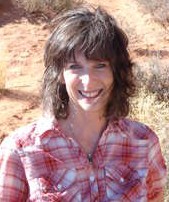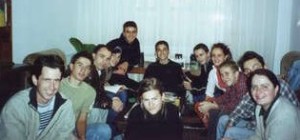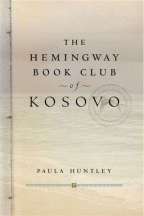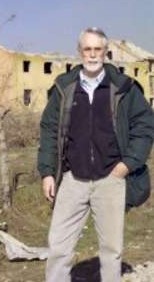February 15, 2012
Nine years have passed since Paula Huntley published her superb memoir, The Hemingway Book Club of Kosovo. Narrated in journal format, Huntley’s book records her experiences in 2000-2001, just one year after NATO troops drove Serbian forces out of Kosova. Naturally, after a decade of civil war, most Kosovarans had suffered all the horrors that go with urban warfare and displacement, and when the shooting stopped, many Kosovarans found themselves homeless and jobless, and everyone found that the educational and legal systems had suffered the same battering. So when Paula Huntley and Ed Villmoare chose to come to Pristina, they did not come as mere observers. Instead, they came to help, Paula by teaching English as a second language to Albanian students, Ed by working through the American Bar Association to help Kosova to rebuild its legal system.

Paula Huntley, author of The Hemingway Book Club of Kosovo (Source: Ms. Huntley's website--click image to view)
Having just re-read this inspiring book, I must applaud the way Paula and Ed came to help. Eschewing know-it-all posturing, they couched their offer to help in compassion for those who had suffered so much and in full awareness of their own limitations. Describing Ed’s need to “do something” in response to the wide-spread agony, Paula records her doubt that “Ed really believes he can do anything of great significance here. He is a man of few illusions. But he is also a man of character and compassion. He can’t just do nothing” (29). Similarly, three months into her teaching, Paula wonders if she has “really [done] anything to help” (129).
They also came to help as partners and peers with the Kosovarans, fully expecting to learn as much as they teach and to receive as much as they give. This respectful stance, their doubts about effectiveness notwithstanding, earned Huntley and Villmoare the trust they would need to help Kosovarans build a future on a foundation of justice and learning
We can see that earned trust in the stories that Kosovarans come to share with Paula and Ed. In working with his legal assistant Blerta, for instance, Ed hears the story of her mother’s gang-rape, a war crime that has silenced her mother permanently (179). Similarly, in teaching stories such as Kate Chopin’s “The Story of an Hour,” Paula engages Ermina and other students in eager discussions of marriage as a relationship shared by “equal partners,” not by a jailer-husband and his prisoner-wife, too often the case, says Ermina, in Pristina (183).
By starting her book club in her Pristina home, Paula also used Ernest Hemingway’s stories to generate more discussions on the power of language to assert human dignity and to effect positive change for Kosova. In reading Hemingway’s The Old Man and the Sea, for example, Paula and her student-guests reflected on the old man’s wisdom: “It is better to be lucky. But I would rather be exact. Then when luck comes you are ready.” Naturally, this quote led to discussion of the old man’s tremendous suffering as he battles the great fish, then, thanks to the sharks, his failure to bring the great fish to the dock. But once again, the old man’s words—“a man can be destroyed but not defeated”—helped her students to realize that the old man had not been defeated, that, in Paula’s words, he had “won self-respect and the renewed respect of the villagers. He maintained his dignity and showed courage in the face of overwhelming adversity” (167).

First meeting of The Hemingway Book Club of Kosovo (Source: Ms. Huntley's website--click image to view)
With such courage placed within reach through language, Paula’s students began to think of “overcoming” their Kosovaran “adversity” as a realistic goal, particularly if, like the old man, they became “ready,” a condition made possible by education and a willingness to use their “new words” (204). Without these new words to “express their fears, frustrations, angers, desires, and ambitions in ways other than violence,” Paula concludes, Kosovarans can have no hope for the future (150). Neither can we.



As I was reading the review of our professor Rich Raymond on Paula Huntley ‘ expereince in Kosovo I felt moved and hopeful too. I felt moved by her experinece with the people after the war in Kosova. Paula’s courage is outsatnding. One can get very touched by her initiative to take such challanges into helping people who have suffered great physical and mental damages from war. Imagine people after the war filled with rage, hate and vengance for those who killed their beloved ones and destroyed everything that was precious to them. It is very difficult to get back on track. It must have taken her lot of hard work and energy to help these people regain what they had already lost. It is moving how she encourages the victims of war express themself about the horrors of war. She does this in a very benevolent way by engaging them into discussing through stories and writings of most renowned writers such as Hemingway and others. She builds their trust by giving them hope and education for the future.Despite the torture, killing, and emptiness that war has brought into their hearts she encourages them to get on with life. I felt hopeful for the reason that “new language” can set things in motion for a better chage in future. People fight for different reasons. Many unjust and unfair things take place only because the strong ones are on power but again in the end they have to sit down and talk. The power of language is somethig that has a magic effect on us and even on those who have suffered enormously and needlessly. This kind of language that Paula Huntley used during her mission in Kosova is the language that may bring positive answers to somebody who has already had only one question and that was “is it worth living anymore without my beloved ones?” As they say “language has no bones but breaks bones” Paula Hutley’s language serves as a barrier breaker for those innocent, unfortunate souls which have already concealed themselves into this barrier being afraid of broken and humiliated again.
Well said, Gezim.
I admire people like Paula and Ed for their courage and strength to make a difference in a post-war country, like Kosovo. We, as Kosovars, would not be able to overcome the terrors of war and to stand on our feet again without the unreserved and generous support of our international friends. In addition, Paula has also managed to establish the “Hemingway Book Club” in order to help the young people understand better Hemingway’s philosophy and wisdom on post-war challenges and traumas, as Hemingway had voluntarly joined wars in order to fight for justice and freedom in the world. I like the expression “a man can be destroyed but not defeated’, which corresponds to the Albanian saying that “a man is stronger than a rock”; I think that this expression also reveals the inner endurance and enthusiasm of a given nation to survive and prevail over destruction and oppression. I will definitely add this book to my reading list.
Yes, Besa, Paul and Ed are my heroes.